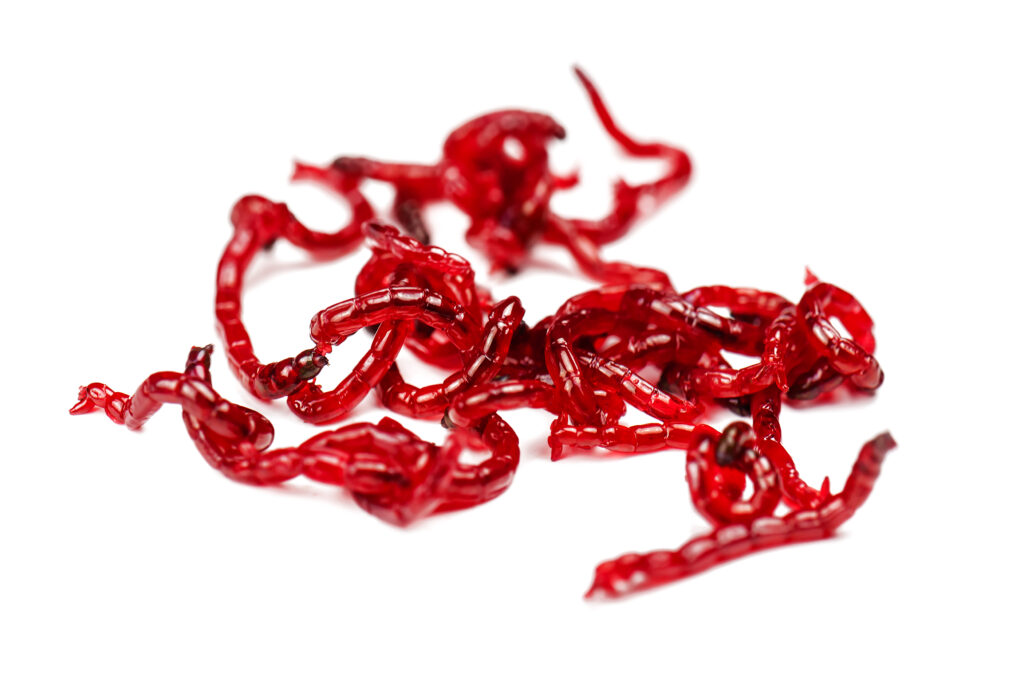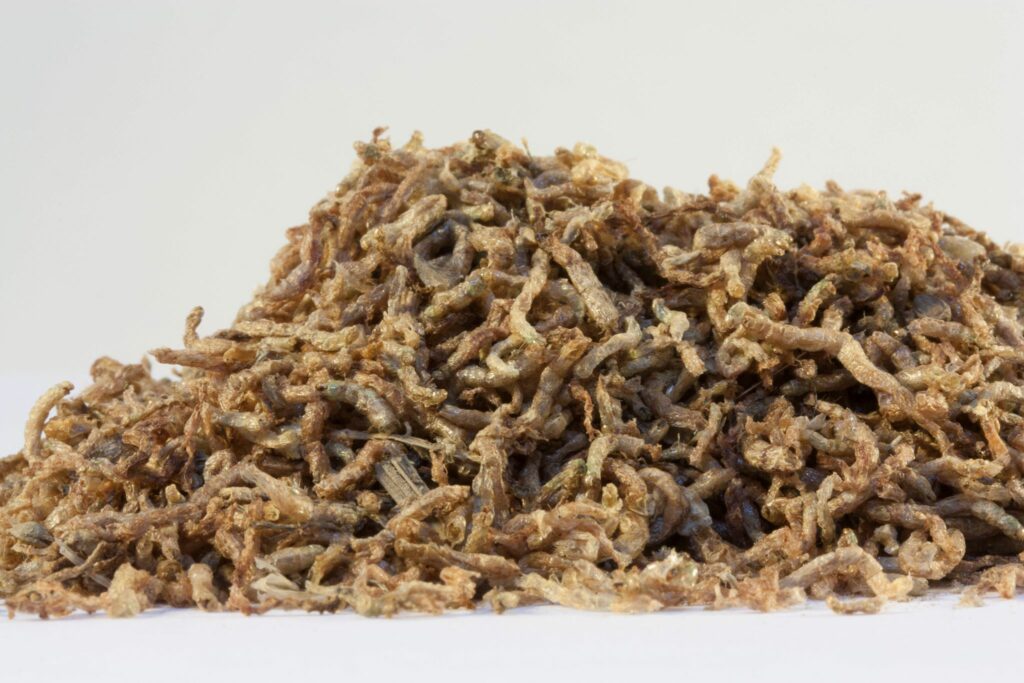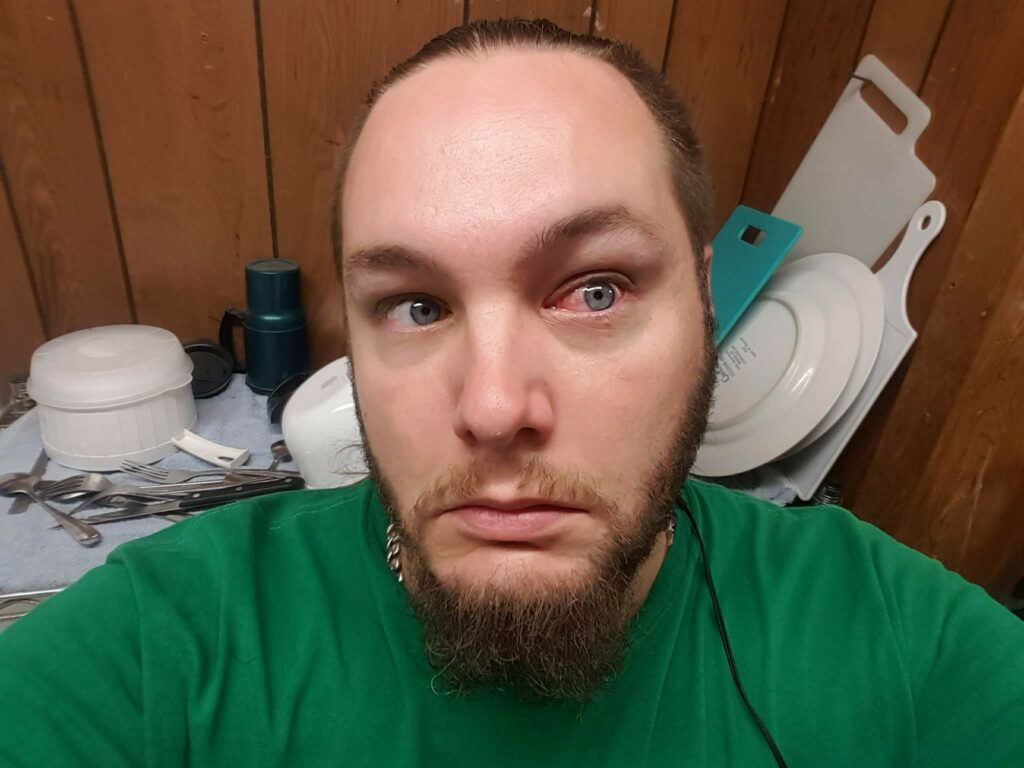
Bloodworms, the larval forms of chironomid midges, are incredibly useful aquarium fish feeds, generally available in both frozen and freeze dried forms. But their use could carry a price for unsuspecting aquarists. Image credit: Vova Shevchuk/Shutterstock
*If you are experiencing symptoms an allergic reaction, contact the appropriate medical personnel*
by Matt Pedersen
Move over, palytoxin, Mycobacterium, and a host of other zoonotic diseases; you’re not the only potential health risks in the aquarium hobby! Time to dive into a surprisingly prevalent health problem associated with bloodworms.
You may not have paid much attention to your fish-food labels, but let this be a reminder to read them thoroughly. Bloodworms, the bright-red mature larval stages of chironomid flies, are true powerhouses as a fish feed. Whether frozen or freeze-dried, they can be used to lure many reluctant feeders to “take the bait.” But if you haven’t been paying attention, you might not have noticed the note on the label that reveals that bloodworms also offer up the potential for strong allergic reactions for some aquarists who use them.
What the Science Says
The science behind bloodworm allergies points to the hemoglobins that give bloodworms their trademark bright-red coloration. These hemoglobins, which are powerful oxygen scavengers, are what allow bloodworms to thrive in the oxygen-deprived bodies of water they call home, but they are also what triggers an allergic reaction in some people.
One journal report suggests that hypersensitivity to bloodworm allergens exists in about 20% of people who are routinely exposed to them. Other studies reveal repeated connections between chironomid larvae and asthmatic reactions. These reports are often tied to environmental factors outside of the aquarium world among people who are in proximity to large natural populations of these midges, including: studies in Japan and Spain finding significant rates of allergic reactions in asthmatic patients, or the case of the delayed onset of hypersensitivity in an environmental surveyor after 10 years of exposure.
One report, covering the case of a 37-year-old fish-biology researcher, concluded, “With the increasing popularity of aquariums, allergy to chironomids may become less of a novelty and become something clinicians should be aware of when searching for the cause of a patient’s atopic symptoms.”
A View From the Aquarium Industry
Jason Oneppo, salesman and head of research and development for San Francisco Bay Brand (a distributor of frozen and freeze-dried fish bloodworms) for the past 17 years, noted that his company is actively working on a revised bloodworm allergy document, to be published in the near future.
From a draft of the report shared with Reef to Rainforest editors: “If you find yourself allergic to frozen bloodworms, freeze-dried bloodworms will cause similar reactions. As moisture is removed from bloodworms in the freeze-drying process, these worms become brittle and can easily turn into a fine powder. Such powdered, lightweight bloodworm particles can become airborne, and inhalation of these particles can cause an allergic reaction similar or greater than touching frozen bloodworms.”
Oneppo also added some personal insights: “We’ve had allergy warnings on our frozen and freeze-dried bloodworm labels for as long as I’ve worked here. We’ve also had allergy warnings on our other freeze-dried labels for at least 10 years. Now, all our freeze-dried products have allergy warnings, even items that don’t require it when frozen.”
A cautionary thought from Oneppo: “[Once you’re allergic to bloodworms, I believe] each reaction gets worse; best to get them out of your house.”

Freeze-dried bloodworms are a popular and highly effective aquarium fish food. Inhaled dust-sized particles from these products could cause a hypersensitive reaction. Image courtesy San Francisco Bay Brand.
What to Watch for
Multiple reports suggest that cross sensitivity could occur; in short, if you’re allergic to things like mites or cockroaches (which have similar allergens), you could have an increased risk of hypersensitivity to bloodworms.
San Francisco Bay Brand’s draft report includes the following possible symptoms of allergic reactions: sneezing, skin rashes, runny nose, or itchy eyes. Additionally, more pronounced asthmatic reactions could occur.
In all cases, should you experience any of these symptoms, it is strongly recommended that you discontinue feeding bloodworms.
Your Stories
The idea of a bloodworm allergy may seem far-fetched; many aquarists have never even heard of it. But when I reached out to contacts and their friends, it quickly became apparent that this allergy is not rare, not by a long shot. Here is just one of many stories I received.
Derek Wheaton, a professional fish photographer at Enchanting Ectotherms, and Senior Field Biologist & Hatchery Technician at Conservation Fisheries in Knoxville, TN, shared that he has a strong allergic reaction to bloodworms. “I was feeding a tank on the top row at work and got the business end of a tiny, unfortunate splash when I squirted the baster into the tank. I avert my eyes when feeding any tank above my head now. But skin contact [with bloodworms] gives me raised welts, itching and burning, and within 3-5 minutes of skin exposure, I’m sneezing my brains out and my eyes will swell shut if I don’t smash some Benadryl. I always wear nitrile gloves whenever I’m working with the stuff. A full hazmat suit would probably be ideal though.”
It bears repeating: *If you are experiencing symptoms, please contact the appropriate medical personnel*
Bloodworm allergies are a bit more prevalent than one might have thought, and they can range from a mild nuisance to rather scary, debilitating reactions. While we’re unaware of any deaths resulting from bloodworm exposure, anaphylactic shock is one of those things you perhaps don’t want to risk.
We’d Like to Hear from You
Wheaton’s story is just one of several we received, but we’d like to hear from you as well!
AMAZONAS Magazine is conducting a simple survey of our readers to get a larger sampling of data, which we will share in a future update. Whether you have a bloodworm allergy or not, your responses are very valuable. We invite you to participate in this 3-to-12–question survey. It will only take a minute or two of your time.
TAKE THE SURVEY NOW!
Online References:
Fishing for Allergens: Bloodworm-Induced Asthma – https://www.ncbi.nlm.nih.gov/pmc/articles/PMC2877067/
Chironomid midge allergy: https://www.ncbi.nlm.nih.gov/pubmed/1567285
Nationwide intradermal test with chironomid midge extract in asthmatic children in Japan: https://www.ncbi.nlm.nih.gov/pubmed/2241583
Studies of bronchial asthma induced by chironomid midges (Diptera) around a hypereutrophic lake in Japan: https://www.ncbi.nlm.nih.gov/pubmed/9105523
Hypersensitivity to chironomid larvae [Spain]: https://www.ncbi.nlm.nih.gov/pubmed/9777536








Hello,
is it possible to share this article ?
I am thinking of some fish keeping groups on FaceBook , as this is important .
Thanks ,
Des.
Thanks Des. Here is a quick and easy link for sharing this article on Facebook; you can select the drop-down menu to publish it to whichever groups you’re a member of. https://www.facebook.com/sharer/sharer.php?u=https://www.reef2rainforest.com/2018/05/03/caution-bloodworm-allergies-can-sneak-up-on-you-short/
Bloodworms make the skin on my hand itch. I have to wash my hands thoroughly after handling them to make sure I don’t get it in my eyes.
Just discovered today that I am allergic to these buggers. I also have adverse reactions to midge bites, so I’m guessing therein lies the connection. My eyes went red, swelled up and became intensely itchy, and my nose started running. I’ve never had a skin reaction, but I must have touched my face shortly after feeding bloodworms to my fish today – I know I touched one of the worms with my hand so I must have made accidental contact. Oops. Won’t be doing that again.
My allergic responses have become more severe with handling blood worms. It started with sneezing, coughing, itchy throat and eyes, and now I get welps and bumps where the blood worm have had contact. I held some under the water to soak, and some floated to my upper arm, and I have welps now where they touched. They look like multiple mosquito bites, and are itchy, and white. I hold my breath with handling them, as to not breathe in the dust, and I wash my hands immediately after. But, it looks like I will need to transition to black worm. Or get my significant other to feed the bloodworms.
I’ve discovered I’m allergic. I have a Mystus leucophasis that we semi-voluntarily adopted. The only food we’ve found he readily eats is dried bloodworms (and tankmates, but my wife says there won’t be any more of that).
I’m allergic to his tank water. If I wash it off in under 15 minutes, it’s just a hint itchy. If I wait too long, it looks like poison ivy. The only cure is to wash with vinegar and let it dry. This is very effective, by the way, so I’m posting here to share that information.
If I forget and touch my eye, it’s swollen conjunctivitis and pretty horrible. We’re still experimenting with alternate foods.
Thank you for this article.
Regards,
Michael O’
I am so pleased to be reading this article as I believe this is a issue I’ve been dealing with this for a year now. I’m at a breaking point as my doctor will not hear me out on this one (or anyone else). I at first thought it was a cactus dermatitis but more recently after some more research I found out about the midge fly. I’ve started to pay more close attention to my surroundings and just noticed this week little red worms coming from my bathtub (I live in a rv in an industrial area) and more on the cover of the pool I swim in. I’m located in San Carlos Ca. Please contact me as I need to know what test should be run to find out if this is indeed what I’m suffering from. I have pictures throughout the last year of the damage this has done to my skin. I can’t imagine what my insides must look like. We can go into further details hopefully over the phone with somebody as it’s a lot to type but I have experienced a whole range of symptoms over the last year and I do believe it has a incubation period. Some answers would more than be appreciated!
I finally figured out im severely allergic to blood worms. I have had 2 swollen red eyes in which I was unrecognizable. My eyes were so puffy it looked like I got into a fight or something. My hands itch and are swelling up & it creeps up my arm. I’m so miserable right now. I’ve washed it for 20 minutes wth Dawn but it still is red tingling & spreads. I’m trying corizon & calling the dr to see if there is anything more I can do besides benadryl I’m sure. I didn’t know this was a thing til I googled to see if it was only me but I’m not alone. I feed these to my discus fish & I try very hard not to touch them but a drop of that blood makes my skin go itch like crazy!
I am very allergic to blood worms and brine shrimp IAM not allergic to shellfish I have had to phone emergency services who confirmed that anaphylaxsis was taking place
OK, based on your own experience, can you be so kind to tell me how long does this allergic reaction last maybe? I m currently on steroid drops for the eyes going on my second day and still no relief from the itch, redness and swollen eye lid and also below the eye. Initially, I tried both an eye wash and Benedryl This is unbelievable
Kelly. #1 – this has nothing to do with bloodworms. #2. Seek a second opinion from a medical professional.
For the last 4 months my 8 year old has had crazy bad allergies every single night once he went to bed. It never happened at any other time or any other place. We did everything, washed bedding everyday, dusted everyday and even changed his flooring to wood. Nothing worked. Then today my husband thought could it be his fish food? (Which he feeds his fish right when he goes to bed). So we had him stick his finger in the food and bam, instant allergies. So I looked this up since it is bloodworm fish food. I had no idea. So happy we finally figured this out.
Glad I had it confirmed I’m not the only one. I was feeding my spotted puffer and the tiger barbs frozen brine shrimp and frozen blood worms- no issues for about two weeks. However- I wanted to get some dried options that I could mash up and make into a paste and put in some silicone trays to freeze as a cheaper alternative.
It took approximately 2 minutes or less of crushing up the dried brine shrimp, blood worms, and krill into a paste before I couldn’t breathe, was coughing, gagging, and snotting.
Two Benadryl’s and 15 minutes later- the symptoms just kept getting worse so I had to resort to the epipen I keep around in case I’m stung by a bee.
It took another hour or two after that before the symptoms calmed enough to not be miserable, but at least I could breathe.
Thought I’d be fine with still handling the frozen chunks I’d bought previously from the store. Nope. I thought I washed my eyes this morning after feeding the fishies- and splashed some water in my face shortly after feeding them.
Not 1 minute later it looked like I had pink eye.
Now back to the Benadryl and a cold pack after a good eye flush. Unbelievable how bad these suckers are.
I’m going to have to resort to gloves, mask, and goggles from now on when I feed the fish.
I have been feeding bloodworms for years, but all the sudden it started with itchy hands, then sneezing now my eyes are itchy and swollen. I attributed to our red wine. But each time I fed the bloodworms my reaction became worse. I am now in day 2 my eyes still swollen and watery. Guess my better half will take over feeding our fish. Just not worth the misery. Now can go back having my wine!
Greg T